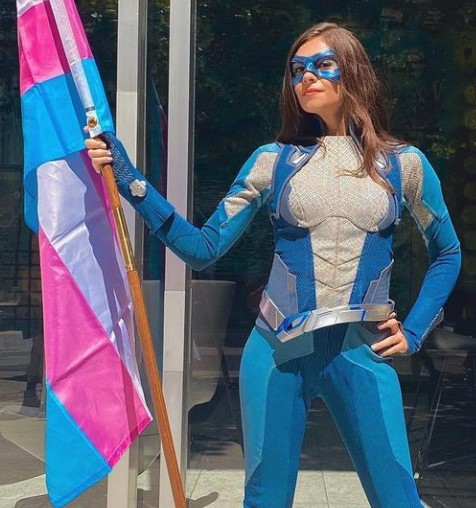In a shocking turn of events, there’s another discussion of Transgender Marxism . I’ll give you all a moment to contain your gasps.
For anyone new to this: Transgender Marxism is a collection of essays by, you guessed it, transgender Marxists, a PDF of which can be found here - https://transreads.org/wp-content/uploads/2021/07/2021-07-15_60f0b3d5edcb7_jules-joanne-gleeson-transgender-marxism-1.pdf
I’m hosting a discussion group on these essays, and so I’m sharing my initial read-through and note-taking with the online class (you).
I hope that we can spark a discussion, or at the very least that we can all learn a little something.
The discussion on the very lengthy intro (and links to all other essay discussions) can be found here - https://lemmygrad.ml/post/395378
Today’s essay is Encounters in Lancaster by JN Hoad.
JN Hoad is a femme de lettres, carer and communist in the North West of England. They are concerned with trans and queer care practices, and how these come to make change in the world. Their work has appeared in Salvage magazine, Blind Field and New Socialist.
Edit: the discussion continues with Zoe Belinsky’s essay here - https://lemmygrad.ml/post/437038


“Our conditions are hardly of our own choosing. Navigating social worlds of alienation, enforced heterosexuality, and class division requires laborious care.”
"Delany [Times Square Red, Times Square Blue] uses the term contact to describe this mingling across classes and cultural contexts, which characterises city living"
“Contact brings those from divergent forms of life into close quarters, for better or worse. Contact encounters, as Delany outlines them, find their scene in the porn theatres, cruising grounds, and side streets where hustlers, science fiction authors, dock workers, priests, and scholars are likely to cross paths. These encounters are likely to disturb, lead to the forging of unlikely alliances, or even liberate.”
The intersection of queerness across class lines (labour, educational, racial, ethnic, disability, gender, etc), especially in the underground/anonymous encounters scenes, is a really interesting examination in the ways that solidarity can be formed even amongst unlikely allies in the face of wider systemic oppressions.
“[Lancaster is] not the kind of place we would expect queers, anarchists, anti-fascists, or Friends of Palestine to set to work in.”
I’ve never even been to Lancaster and even I had a pretty negative impression of living in Lancaster as a queer person. However, I wouldn’t say I didn’t expect them to “set to work” in Lancaster: queer people are carving out communities everywhere in the world, and as hopeless as it seems sometimes in the face of capitalist exploitation, so too, are anti-fascists.
“Being trans requires you to develop a knack for encounters. You learn to slip away from the scowling guy approaching you from across the street; you unconsciously soften when saying ‘these are my pronouns’ brings a response in kind; you let strangers at the bar buy you drinks in exchange for impromptu agony aunting; you learn to be seduced while quietly demanding a respect which is more often violated”
I’ve never heard the term “agony aunt” before, but yeah, it is fitting. Trans people (and trans feminine people especially) are often expected to function in the role of reproductive labourers for the wider queer community. Often, due to our specialised experience in social reproduction and community care, coupled with the feminsation of reproductive labour, and taking into consideration people’s comfortability in seeking affirmation of their troubles from those they deem more troubled, trans femmes end up being sounding boards for frustrations, the go-to for venting, seeking advice, unloading burdens
“Louis Althusser gives the most widely cited Marxist account of an archetypal urban encounter: a cop shouts ‘Hey you!’ at a young man in the street, and at this hailing he turns his head, suddenly guilty. This is the moment of interpellation, in which a subject is hailed only to become the name he is called, to be caught in the guilt which nabs him in the middle of the road.”
“[Althusser] begins to describe an aleatory materialism”
“According to Classical Greek philosopher Epicurus, in the beginning ‘an infinity of atoms were falling parallel to each other in the void’. At some undefinable point, one atom swerved and collided with another; the two got caught up, an entanglement of matter which clumped and congealed into the substantial, variegated world in which history can take place”
“Althusser commits to this strange and metaphysically radical thesis. He is impressed by the idea that ‘the Swerve was originary, not derived’. That is to say, a break with a straight path had to occur before any measurable change, order, or reason came about in the world”
“'the atoms’ very existence is due to nothing but the Swerve and the encounter prior to which they led only a phantom existence’.”
“This is a certain kind of Spinozism, according to which the world is ‘composed of individual bodies which are distinguished from each other merely by motion or rest, rapidity or slowness’. Neither intrinsic attributes nor difference of substance makes the atoms what they are. Difference arises when they bounce off each other, like blank billiard balls. The universe, from its very origins, is but a series of encounters.”
This is a theory of existence, or the non-reality of existence, that is being furthered in physics currently with studies of quantum entanglement. The idea is that there is no absolute property of reality. Matter itself is a reflection of interactions, whereby the properties of any atom are fixed at the point of interaction. It’s a deeper understanding of the probability clouds of the uncertainty principle. On a macro level, there are so many interactions happening simultaneously (an infinitude) that there appears to be observable, absolute properties. But taken to its extreme microscopic level, absent interaction there are only potentialities: the encounter itself is what defines the observable properties.
“I, too, want to explore a historical materialist account of encounters, swerves, and gambles.”
“I want to consider how bodies in labour create movement, mutually. A thick aleatory materialism would consider the lived history, felt weight, and active work each body assumes”
This whole essay really does read like prose poetry, I’ll probably quote a lot of it without much to add. However, this is such a fascinating line of thought. So often in discussing these systems, the human element is reduced to its base functions of labour and value. Even those concerned with improving the lives of others fall victim to this line of thinking in their concepts and arguments, which I would say is an inevitable (though opposable) result of centuries of capitalist objectification.
This is why early capitalists were so readily accepting of Cartesian mechanical philosophy: it provided the perfect, “reasoning,” excuse to propagate an understanding of humans as mere labour functions.
Hey comrade, I can relate. I’ve been there, and still am in a way because it’s a constant struggle not to fall back into old, bad habits. The more effort we put into changing our habits, the easier it gets over time, but then BAM we get triggered and if we’re not ready we trip and we’re back in that place again.
I’m not an expert by any means, but I’ll share what works for me and hopefully it helps you in some way. I have an idea in my mind of the ideal person I want to be. It gives me a reference point to strive towards. I also have a very strict schedule that I follow that puts me on track to achieving that goal. If I deviate from that schedule then I know I’m off track and I need to fix something.
I still do drugs, mainly just smoke weed, but this works into my schedule by only doing them on weekends, and usually only at night so I can be productive throughout the day. This gives my body at least four days to recover and allow me to be my best at work. I still get tempted to smoke during the week, but having planned activities and a strict sleep schedule helps fight off those temptations.
The hardest part is starting. Once we have momentum by doing the right things consistently, it becomes much easier. I also never want to go back to that place, so having those dark memories in mind helps me resist the urge to give in.
I hope that helps. Feel free to reach out if you wanna talk!
“But transition, like cruising, does not happen in a void. As we will see, there is a matrix of social relations which transition moves in. There is also a history to the flesh of each of our bodies that we bring with us to any social scene. A materialist approach to encounters should situate them in the fullness of the flesh and complexity of the matrix in which these interactions occur.”
This harkens back to our earlier discussions of Social Cognitive Theory and its integral function as a means of social reproduction of trans identity. Transition occurs as a process of interactions: the transitioner with other queer people, the transitioner with cis people. Interactions that shape not only the identity of the trans person through their understanding of the relation of body to gender, but also their perception by the other, and its function in shaping the outcome of such interactions.
Based and spacecowboy pilled.